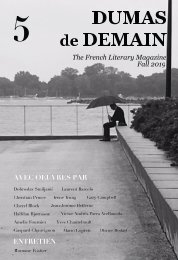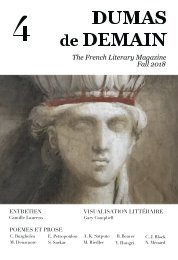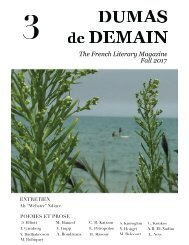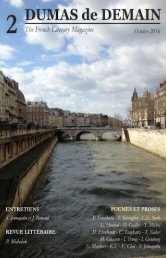Dumas de Demain: The French Literary Magazine Vol. 7
Create successful ePaper yourself
Turn your PDF publications into a flip-book with our unique Google optimized e-Paper software.
7 DUMAS
deDEMAIN
TheFrenchLiteraryMagazine
Autumn/Winter2021
POEMESetPROSE
ENTRETIEN avec
M.Gassara
J.JBaptiste
L.Skura
A.Va
P.Mvula
M.Emmanuel
E.Kleinholz
VirginieGreene
DANS CETTE PUBLICATION
Note de l’éditeur 2
Entretien avec Virginie Greene 5
POÉSIE
Mohamed Gassara Ombre et mélodie 13
Jerrice J. Baptiste L’homme avec L’hiver 15
Les Danseurs 16
Linea Skura Le Choix 17
Philippe Mvula Palmier kilométrique 19
Niplalas 20
Le peuple gagne toujours 21
PROSE
Margaux Emmanuel Kamakura 22
Emil Kleinholz Le Faucon et L’Écureuil 25
Aurore Varela Haine 27
Septième édition | 1
Note de l’éditeur
C’est une vérité humaine que l’homme ne peut pas connaître sa propre beauté
ou percevoir un sens de sa valeur jusqu’à que ce soit reflété dans le miroir de
la compagnie d’un autre.
Quand nous avons créé Dumas de Demain, c’était avec l’intention d’unir les
francophones et francophiles à travers le monde et d’établir une communauté
basée sur notre amour pour la langue française. Plusieurs années plus tard, et
nous sommes toujours aussi ravis que chacun d’entre vous soit ici avec nous
sur la page.
Nous sommes toujours confrontés par les complications de la pandémie dans
nos efforts de s’approcher les uns des autres; je suis tout de même étonnée par
la versatilité de notre créativité, les nouveaux moyens que nous avons
employés pour rester en contact malgré la pandémie. Nous avons célébré des
événements via appel vidéo, nous avons retrouvé l’art perdu de la
correspondance épistolaire — les méthodes de communication traditionnelles
et nouvelles.
Nous avons choisi ces poèmes et ces œuvres de prose dans cette édition parce
que nous croyons que chacun d’eux démontre une perspective unique sur
l’unité. L’unité à travers la translation ou l’unité à travers les expériences
communes, les mythes, ou la mémoire collective. Nous sommes soit
ensemble, soit à l’écart, mais nous pensons tout de même à l’unité. Il y a
autant d’approches à la création d’un poème qu’il y a façons d’être ensemble.
Dans les pages de ce volume, vous trouverez seulement quelques-uns de nos
préférés.
Nous avons eu l’opportunité magnifique de travailler avec des poètes, des
écrivains et des éditeurs tellement doués pour compléter la 7e édition de
Dumas de Demain. Nous espérons que vous trouverez quelque chose ici pour
vous, qui vous rappelle une communauté que vous pourrez toujours porter
avec vous. Merci d’être avec nous. Tous ensembles, partout où vous êtes.
* * *
2 | DUMAS de DEMAIN
It is an absolute human certainty that no one can know his own beauty or
perceive a sense of his own worth until it has been reflected back to him in the
mirror of another loving, caring human being.
When we created Dumas de Demain, it was with the intention of bringing
together Francophones and Francophiles from across the world, creating a
community united by our shared love of the French language. All these years
later, and we are still so thrilled that each of you are joining us here on the
page.
be times continue to present challenges to our best efforts to connect, but I
have been astounded at the flexibility of our creativity, the many thrilling and
dynamic ways we have stretched to meet each other against all odds in a
deeply disconnected time. We have celebrated milestones over video calls,
and we’ve written letters; we’ve found our way back to old methods of
communicating and we’ve invented new ones.
We have collected these poems and works of prose together in this edition
because we believe that each of them reflects a unique perspective on what
togetherness means — togetherness through translation or togetherness
through identifying shared experience, myth, or collective memory. Either
reflecting in the midst of togetherness or meditating on its absence. bere are
as many ways of writing a poem as there are ways of being together. In these
pages, you will find just a few of our favorites.
We were lucky enough to work with talented writers and editors to create this
7th volume of Dumas de Demain. We hope you find something that resonates
with you in these pages. bank you for being here. All of us together here,
wherever you may be.
— Emma Michalak
Septième édition | 3
4 | DUMAS de DEMAIN
ENTRETIEN AVEC UN AUTEUR:
VIRGINIE GREENE
Virginie Greene is a Professor of French in the Department of
Romance Languages and Literatures, at Harvard University. She is a
specialist of medieval literature, with strong interests in history and
philosophy, and in Proust and his times.
She is the author of Logical Fictions in Medieval Literature and
Philosophy (Cambridge University Press, 2014), a study of seminal
classical, medieval and modern literary and philosophical texts
leading to a broader reflection about fiction as a universal human
trait and a defining element of the history of Western philosophy.
* * *
1. You write that “If we understand abstraction as pulling (trahere)
general ideas from (ab) real or fictional particulars, then
adstraction is the operation of pulling the general toward (ad) a
fictional particular.” Abstractions and adstractions help connect
the real or fictitious and the imaginary or general. What are the
differences, if any, in the objectives or outcomes of employing an
abstraction vs an adstraction? Would one be better used in cases
that the other would not?
Like many things happening in our minds, abstractions and
adstractions can be subconscious or conscious, intentional or
unintentional processes. I invented the neologism "adstraction" to add
more nuances or other perspectives on such processes, and to show
the proximity between logical thinking (tending toward abstract,
general ideas) and fictional thinking (tending toward abstract,
particular ideas). Intentional abstraction may be more useful to solve
problems such as how many barns animals can fit in a given barn, but
intentional adstraction may be more useful to take into account the
Septième édition | 5
perspective of said animals, or people working and living with them,
and anticipate side effects of decisions based only on abstraction. I
believe that in our daily life we use both back and forth to make
decisions, understand situations, and navigate in space and time. Both
are necessary and often intermingled.
2. You write that “Kripke describes the system of reference and
naming that creates what he calls “rigid designators” as a
historical and collective process: ‘In general our reference depends
not just on what we think ourselves, but on other people in the
community, the history of how the name reached one, and things
like that.’” The act of naming and referencing is indeed a
significant historical and collective process. Do you believe there is
a way the system of reference and naming, the “rigid designators,”
can be made more flexible and dynamic to accommodate a rapidly
changing world?
I cannot answer for Saul Kripke! But I will try to answer according to
my limited lights. "Rigid designator" is a concept of analytic
philosophy that is applied mostly to proper names. Its definition in
the Stanford Encyclopedia of Philosophy is: "A rigid designator
designates the same object in all possible worlds in which that object
exists and never designates anything else." (LaPorte, Joseph, "Rigid
Designators", The Stanford Encyclopedia of Philosophy (Spring 2018
Edition), Edward N. Zalta (ed.), URL =
<https://plato.stanford.edu/archives/spr2018/entries/rigiddesignators/>.)
In this sense, a rigid designator cannot be made less
rigid, because rigidity doesn't depend on decision, choice, or
historical change: it is a trait of our system of signification and
reference, which allows us to identify individuals consistently. This
includes non-existent and fictional ones. I mention rigid designators
when I claim that studying the construction of adstracted beings such
as a lion in a fable adds nuances in our understanding of the way we
imagine or think about individuals. I don't take a position on the
philosophical usefulness of the concept of "rigid designator". Your
question raises a different set of issues that Kripke doesn't address, at
least not in Naming and Necessity. Can certain traits of natural
languages (such as the grammatical indication of gender) be at some
point modified to accommodate historical social changes (such as an
6 | DUMAS de DEMAIN
evolving perception of gender)? I personally believe that yes, this can
happen, but it is a complex process, and, while it happens, it is hard
to see what will become integrated into everyday language and what
will not in the long term. It depends on users. I would be curious to
know if Kripke (or other analytic philosophers) considers terms such
as "man" or "woman" as rigid designators. . .
3. In Chapter 4, you describe Aristotle's principle of
noncontradiction –the existence of a science of being and its
attributes – as well as Aristotle's opponent, Amphibeston, whom he
introduces in order to argue that his principle is irrefutably correct.
How do you think Aristotle's opponent manifests itself in the
modern era where some things, via social media or otherwise, can
appear self-contradictory yet exist, nonetheless? In other words, do
modern technologies and the novel abilities to be dual to one's own
nature present new avenues or solidify the opponent's possible
refutation to the principle of noncontradiction?
The opponent as a troll? Or a blogger? Or an avatar? Or simply as
someone using social media? This would be an interesting new
chapter in the ongoing biography of Amphisbeton! But I will not
write it. I don’t think that social media and other technologies based
on computation and telecommunication change essentially the
question of contradiction as asked by Aristotle. But they may change
the way we perceive or practice contradiction. My position now is
that the principle of non-contradiction is a useful logical tool when
used in moderation, that is, when restricting "contradiction" to a
narrow meaning: I agree that at a given time I cannot be both sitting
and not sitting on this specific chair. Of course, I can be sitting on
this chair and imagining myself sitting on another chair, or doing
something completely different, but that would not be contradictory
in Aristotle's sense. Using different persona, saying one thing at some
point and the opposite later, feeling divided between various aspects
of oneself, or feeling made of different "selves" are not contradictory
in this narrow sense either. They are contradictory in a larger sense of
the term, which overlaps with terms like "ambiguity" and
"ambivalence". In short, as Aristotle prescribes, let's not be
contradictors in the dumb, narrow sense, but let's enjoy our many
contradictions in the larger, creative sense, as many writers, lovers,
Septième édition | 7
thinkers, and other folks do.
4. In Chapter 5, Anselm's argument presents God as a somewhat
contradictory being while arguing the similar noncontradiction of
his existence. In fact, some faiths understand the concept of God
as being everything and nothing, both joined and disjointed, similar
to the construction of the Amphisbeton mentioned in the previous
chapter. Do you think that Amphisbeton could be the idea of God,
or some supernatural, superhuman entity responsible with creation
and destruction? Similarly, do you think that the Aristotelian
principle of noncontradiction could serve as a justification for
religion, as a "science" which investigates being as being and the
attributes which belong to this in virtue of its own nature?
This is a question for a better philosopher and theologian than I am.
Amphisbeton, in Metaphysics IV, is a contradictory figure, in both the
narrow sense and the large sense I distinguished in my previous
answer. He is called into existence only to demonstrate the
impossibility of his existence, but once created in the text, he
becomes (in my reading) a liminal, indispensable figure of opposition
and contradiction in the large sense. When I worked on Logical
Fictions, I did not think of the opponent in Aristotle or Anselm as a
figuration of God. I thought of it as a fictional tool used to refute
something (sophistry for Aristotle, and atheism or other religious
negationism for Anselm). I still view it as representing human
limitations and possibilities rather than a divine being. Perhaps the
Opponent of the Opponent would be God?
Your last question is also hard to answer. Does the principle of noncontradiction
lead to an affirmation of the necessity of God's
existence as Anselm's ontological argument does? I don't know.
There are different interpretations of Aristotle's "religion." A larger
question that your questions raise is why contradiction (in the narrow
and the large sense) seems to be part of many religions either as an
attribute of God, or as the fate of humans deprived of God.
5. You note the following in your work: “My guess is that Aristotle
was the first consistently to view other philosophers as
predecessors, contemporaries, and successors, instead of eternal
8 | DUMAS de DEMAIN
interlocutors. I also surmise that in order to historicize and
genealogize philosophy Aristotle had to involve a patricide in the
story, which he did reluctantly and indirectly with the figure of
Socrates, and bluntly with all philosophers past, present, and
future, including himself, as he renounced the belief that
philosophy could be a ticket for immortality” (Chapter 8, pg 165).
Do you believe this severance of conversational ties led to more civil
understanding or more hostile disagreement among Aristotle’s
successors? What impact, if any, do you believe this philosophical
historicization had on writers of fiction and stories based on
philosophical figures?
My hunch is that Aristotle's gesture in creating a genealogy of
philosophers led to more passionate disagreements, but also more
passionate loyalties. It is so hard to figure out how the Pre-Socratic
philosophers behaved toward each other since the little we know
about them is filtered through Aristotelian lenses that I would hesitate
to say all was idyllic or less emotional before. I want to add
something that I may not have sufficiently underscored in my book:
the change in the status of the philosopher and the imagined relations
between philosophers across time does not result from something
Aristotle did entirely knowingly and all alone. It results from a
complex relational network involving the Sophists, Socrates, Plato,
and Aristotle. Before them (that is before the 5th c BC), I am not sure
that there were any written narratives about philosophical figures.
Perhaps lore, stories, legends about semi-mythical figures that were
not even called philosophers (Pythagoras, Empedocles, etc.). If I am
right on this, one could claim that Aristotle (continuing and
responding to the Sophists, Socrates, and Plato) made philosophers
legible and writable.
6. You talk about how Roscelin and Abelard, despite their
differences and disagreements, understood each other’s position
and recognized that they came from different circles. Indeed, “ideas
do not reflect a personal, individual choice; they represent the
adherence of an individual to a group. In this regard, Roscelin and
Abelard were perfectly of their times and perfectly understood one
another” (Chapter 8, pg 189). In your opinion, how would Roscelin
and Abelard view and respond to (if at all) the lack of
Septième édition | 9
understanding — across political, religious, ethnic, racial, etc. lines
— in the world today?
When I wrote that Roscelin and Abelard "perfectly understood one
another" I meant that they shared an understanding of their social and
ideological positions, although they acted horrendously toward one
another. I would not take them as a model of "understanding" in the
sense of good will toward people of different opinions, backgrounds,
etc. Roscelin remains a shadowy figure, mostly indirectly known, so I
won't try to guess his ethics. From what remains of Abelard's
writings, it can be said that he had a complex understanding of what
it is to be human, rational, and Christian. This did not help him much
in his life, which was marked by violent quarrels, exclusions, and
exile, in part because of his own temper, in part because of
established intolerance and violence in the culture of his times. Can
his writings and the story of his life help us to solve our own
conflicts? Probably not, but they can help thinking about them. It is
unfortunate that we don't have as much preserved from the thoughts,
sayings and writings of another philosopher and theologian he was
associated with: Heloise. She may have a few things to tell us about
crossing boundaries.
7. You note that Abelard, rather than inheriting the ideas of one
philosopher, “inherited quarrels and ways of quarrelling” from his
predecessors (Chapter 8, pg 188). You also note that the “practice
of philosophy becomes strongly associated with hostility rather than
with friendship – both being equally phantasmatic” (Chapter 8, pg
190). How, if at all, do you believe philosophy’s association with
hostility and disagreement has impacted relationships and
interactions between people today? Can philosophy recover from
this association and, possibly, guide other polarized fields such as
politics to more civil forms of disagreement and dialectic?
Your question made me realize that in my book I have forgotten to
signal that as hostile and quarrelsome these medieval philosophers
and theologians look to us when we study closely their exchanges
and relations, at least they did not routinely kill one another in
tournaments and warfare, as did many of their male relatives. The
clerical culture (medieval philosophers were clerics) was influenced
10 | DUMAS de DEMAIN
by the knightly culture, and vice versa. They were both male cultures
based on a firm conviction that men were born to dominate, and
women to submit. Between the Middle Ages and today, philosophy
and other fields of knowledge have considerably evolved, and I
would not consider contemporary philosophy as a discipline more or
less aggressive than any other. Literary scholars at times can be quite
ferocious toward one another (in words of course, rather than in
deeds). It could be relevant to look at the effect of the presence of
more women in positions of power in fields traditionally (and this
until very recently) reserved to men. The presence of non-white
scholars also may shift the dynamic of relations inside professional
groups. I am not suggesting that only white males imbue
disagreement with competitiveness and violence, but that the game
may be changed, and new standards of relation may occur as the
demographics change. To return specifically to philosophy today and
its impact outside the discipline itself, I believe that, today,
philosophers and other scholars trained in argumentation,
experimentation, and criticism can provide models and examples for
evaluating which argument is consistent and reasonable, which
statement is fact or evidence based, which data are construed
critically and used appropriately. It is true that academic discourse
does not intersect easily with larger, public discourse (such as
politics) but everything is changing fast these days. These past five
years have been dizzying for all of us, academic or not, and we all
need guidance (rather than quarrel) from one another.
8. Dumas has said that “friendship consists in forgetting what one
gives and remembering what one receives.” How do you believe this
view contributes to the dialectic description of friendship you
provide in your work?
If only nation states could behave in the way Dumas defines
friendship! So much adverse consequences have come from unequal
alliances, with insistence on the payment of "debts" rather than on the
recognition of what has been received. In my book, I looked at
friendship from a narrower perspective: the discourse on friendship in
Western philosophy from Plato to Derrida. I focused on one
characteristic of this discourse: the exclusion of women from ideal
philosophical Friendship. Women can be friends (generally between
Septième édition | 11
themselves) but not Friends (and particularly not Friends with men). I
don't know how Dumas viewed and practiced friendship. Could he
admit women as friends? Was his definition inspired by a practical
sense of friendship as a succession of small (or sometimes big)
exchanges in gifts and services? Or by aristocratic largesse? Or by a
romantic sharing of affects? Or by the recognition of another self as
so close to oneself that giving or receiving become the same thing?
12 | DUMAS de DEMAIN
MOHAMED GASSARA
DI DOBROSLAV SMILJANIC
Ombre et mélodie
La flûte
Fait danser mes bulles de sang.
Le temps se réjouit
Sur les palissades de l’enfance.
Il contemple le soleil
Qui bout sur la poitrine
De nos pauvres chuchotements.
On rit d’Apollon…
Les cordes sombrent dans la fadeur,
Les mots venteux frottent les dents de la création
Avec le gingembre des terres solides.
Tu vois l’ombre des alcôves détruites,
Et la tendresse des gorges bariolées
Peindre les corps d’Épicure
Dans l’atelier des amertumes.
Les violettes font leur pèlerinage
Sur l’œil de la pitié.
On sourit comme des ciseaux,
On craint la nuit des fins,
Le volage des incubes,
Septième édition | 13
Et l’astre hurlant
Au milieu des papiers dormants.
Il ne reste que le soupir vaillant
Qui nous rappelle le mariage
Des mers et des roches
Dans une nuit sans épines.
14 | DUMAS de DEMAIN
JERRICE J. BAPTISTE
L’homme avec L’hiver, La Femme
avec Le Printemps
Je t'ai vu au pied de la montagne ce matin.
Le soleil était caché entre tes bras.
Mon amour qui a embrassé la lumière d' hiver.
Il dirige les ailes des oiseaux avec son doigt
sur la montagne qui a l' air triste et gris.
Moi, je me rappelle du dernier printemps
sur les pierres de la rivière. Je me suis reposé
entre les arbres.
Le signe vient, mon coeur est joyeux
pour une nouvelle année.
Je partage mon refuge avec toi.
Septième édition | 15
Les Danseurs
La statue des deux danseurs, un homme et une femme, est proche de
la fenêtre de la boutique. Leur beauté m'attire. J'étudie leurs visages
inconnus. J'admire leur peau d'ivoire, leurs jambes étendues et les
positions de leurs pieds et leurs orteils pointus. Ils se tiennent la
main. Leur joie est palpable à l'entrée de la boutique; il y a des fleurs
roses près de la sculpture qui me font sourire en ce jour ordinaire.
Mes mains glissent sur les visages sans des yeux, sans nez, sans
bouche, sans oreilles. Seulement des visages brillants et lisses. Ils ont
sauté et gelé dans l’air. Les danseurs m'ont déjà inspirées. A la
maison, je vais sauter comme eux, danser avec liberté. Ils seront les
spectateurs de ma création chaque jour. J'offre tout ce que j'en ai dans
ma bourse mais le caissier a secoué la tête, “non.”
Il m'a dit que c'est une sculpture extraordinaire. L'artiste qui l'a faite
est aveugle. Il habite au centre de la ville. Il refuse de vendre la
statue. Il dit que c'est un cadeau pour le peuple, pour admirer et
apprécier la forme de la danse de ballet. Je caresse la statue une
dernière fois. Mes yeux sont bénis d'avoir vu la danse parfaite créée
par un artiste aveugle.
16 | DUMAS de DEMAIN
LINEA SKURA
Le Choix
Quand j’étais petite j’ai choisi le français
Puis j’ai grandi et j’ai déménagé
Mais tous les gens parlent l’espagnol dans cet endroit
Et j’ai cru que j’ai peut-être fait le mauvais choix
J’ai décidé d’étudier au pays du soleil
Et j’ai su qu’ici ils ne parlent pas le français
Mais j’aime la chaleur et la sècheresse
C’est pourquoi je trouve la terre enchanteresse.
Quand j’étais petite j’ai choisi le français
Puis j’ai grandi et j’ai déménagé
Mais tous les gens parlent l’espagnol dans cet endroit
Et j’ai cru que j’ai peut-être fait le mauvais choix
J’ai esperé pouvoir apprendre les deux langues ensembles
L’espagnol et le français souvent se ressemblent
J’ai dû choisir et j’ai choisi le français
Septième édition | 17
J’ai travaillé dur et maintenant je peux le parler
Quand j’étais petite j'ai rêvé que je parlerais le français
Puis j’ai grandi et j’ai bien étudié
J’ai trouvé quelque gens qui parlent le français dans cet endroit
Et je sais que j’ai fait le bon choix
18 | DUMAS de DEMAIN
PHILIPPE MVULA
Palmier kilométrique
Pour le Gazon, dont le corps entier se pose sur le sol pendant toute sa vie,
Atteindre la hauteur du Palmier est une utopie. Quant à son bourreau,
Le Palmier Kilométrique, qui fait la pluie et le beau temps dans la région,
Menacer la pauvre victime impuissante est devenu l’activité principale,
Intentionnellement exercée selon le principe cruel de la lutte pour la survie
Et la conservation de l’espèce. Mais hélas, l’arbre géant rêve debout et
Risque de tomber brusquement car chaque jour n’est pas dimanche !
Kentia, Areca, et autres plantes semblables au géant Palmier mais plus
Intelligentes, choisissent de rester et vivre en compagnie des plantes dans
Le jardin. Toutes ces plantes, qui refusent de monter très haut, sont sages car
Oser s’approcher du ciel, comme dans la Tour de Babel, c’est attirer des
Menaces du propriétaire du fief qui, un jour, peut se réveiller et, sans procès,
Écoutez-moi bien, sans sondage, faire abattre le Palmier Kilométrique et
Tourner ainsi décisivement la page dans l’histoire de la vie du méchant arbre.
Rien n’étant impossible dans la vie, même un vent violent peut souffler et
Intimider ou éliminer l’orgueilleux qui monte vainement dans le ciel à risques,
Qui chante et qui danse en écrasant le Gazon qui, malgré sa taille économique,
Use de sa faiblesse pour servir de tapis, se faire piétiner par tous dans la cour
Et, en même temps garder son identité de fils du propriétaire de la cour royale !
Septième édition | 19
Niplalas
Ne vous
Inquiétez donc
Pas du lendemain ; car
Le lendemain
Aura soin de
Lui-même.
A chaque jour
Suffit sa peine.
20 | DUMAS de DEMAIN
Le peuple gagne toujours
L’heure viendra où la volonté du peuple qui
Est souverain va se concrétiser tel que prévu.
Puisque le peuple jouit des droits naturels
Et qu’il subit des pressions inhumaines,
Un jour, cette pièce maîtresse du système
Prendra le contrôle de son destin et parlera
Le langage décisif qui l’anime toujours
Et obtiendra ainsi gain de cause !
Gare à toi qui te fais des illusions ; toi qui
As une parcelle de pouvoir ; toi qui crois
Gagner le match contre le peuple que
Nul ne vote ni n’élit ! C’est lui qui donne
Et reprend le pouvoir quand il veut !
Tu as donc tout intérêt à te confier à lui,
Oh petit orgueilleux ! Tes projets sont
Une pure et simple utopie, un rêve, un
Jeu des enfants qui confondent ce qu’ils
Ont à ce qu’ils désirent obtenir. Tu es
Un malade mental qui s’ignore ! Et tu
Risques d’être terrassé comme ceux qui
Se sont comportés comme toi hier !
Septième édition | 21
MARGAUX EMMANUEL
Kamakura
J’allume la caméra. Le film tourne : sa silhouette se dessine
sur un ciel rosé. Je m’approche : Il a le torse nu, la peau bronzée, un
sourire ponctué par deux fossettes enfantines. C’est le matin, tôt, le
doux soleil se lève sur ses épaules et on distingue Enoshima, flottant,
encore endormie dans son berceau de brume.
L’eau froide du Pacifique rougit sa peau, mais il est
indifférent, habitué. Il essore une serviette de plage trempée, l’eau
fraîche coule et mouille le sable fin à ses pieds.
Sur la plage de Kamakura, on est seuls, on respire. Je
tourne la caméra : on voit les monts Tanzawa émergeant de la mer
nuageuse. Ici, tout est semi-opaque, loin de Tokyo où chaque
moment est langueur et lourdeur.
L’odeur de la brise salée roule sur ma langue ; j’oublie l’air
vicié de cigarettes fumées hâtivement lors des rares pauses et de
relents de verres d’alcool engloutis dans des ruelles étroites le soir.
Lui, il ne connaît pas cette vie-là ; il vient d’ici, il ne doit
pas connaître la sensation d’une cravate nouée autour de son cou.
Il m’appelle, me dit de le rejoindre dans l’eau. Je ne suis
pas là, je suis derrière la caméra.
“Allez, viens !”
Je ne suis pas là. Je le laisse être.
22 | DUMAS de DEMAIN
Le soleil défie maintenant l’estompe de la brume. On voit
alors des bateaux qui tachettent l’horizon, leurs voiles visibles au
loin, légèrement ballotées par la brise matinale.
C’est un de ces matins mouillés de rosée et de lumière, où
chaque moment est une éclaboussure qui ondule dans ma mémoire.
On peut disparaître dans la douceur. Là-bas, à chaque instant-
Attends- je dois changer de film.
On peut voir un tablier de jeu de go oublié sur le sable.
C’est l’après-midi, on le voit se laisser baigner dans le soleil sans
retenue, détendu. Son corps allongé sculpte le sable chaud qui semble
presque le border.
Il y a des pots vides de kakigōri à côté. On mange comme
des gamins ; le sirop de fraise coule sur nos doigts, sur nos mains et
sur le sable blanc qu’il constelle de gouttelettes rouges. Il rit sans
cesse.
Il n’y a pas d’horloge cadré sur un mur derrière nous : le
temps, il s’écoule sur nous. Les vagues avancent furieusement sur la
plage puis se retirent, un mouvement sauvage qui nous échappe,
incontrôlable. On se laisse bercer par leur bruit, comme un vinyle
rayé qui joue sans cesse le même morceau, pas une octave plus fort,
mais qui tire sur le temps comme si c’était un fil. C’est ça, Kamakura
: les jours qui se défont comme des ricochets sur l’eau.
Le soleil se fond dans la mer, sur les flots reluisent ses
derniers éclats rouges. On arrive au bout du film.
Lui, il n’est plus là. Je ne vois plus les rivages, seulement
leurs silhouettes qui me tiennent. Le clapotis des vagues s’affaiblit, se
perd peu à peu dans les bruits de la ville qui finissent par l’anéantir.
L’odeur iodée de l’air se mêle de tabac et de café dilué de
distributeur.
Septième édition | 23
Le film s’arrête. La pellicule est noire.
Une lumière froide me fait mal aux yeux.
“Les chiffres, t’as intérêt à les avoir pour demain.”
Il pose une pile de papiers sur mon bureau.
“Vous les aurez ce soir.”
Il y a une fenêtre, avec une vue qui donne sur
d’innombrables gratte-ciels jusqu’à l’horizon. On ne voit pas la plage
d’ici.
A Kamakura, je n’y ai jamais vraiment été.
Fermer les yeux, faire son film, n’être que le spectateur de
sa vie rêvée.
24 | DUMAS de DEMAIN
EMIL KLEINHOLZ
Le Faucon et L’Écureuil
Il était une fois un écureuil qui était très intelligent et astucieux : Un
jour, pendant qu’il recueillait des noix, un faucon le saisit.
En volant au-dessus de la forêt, l’écureuil dit d’une voix calme et
claire, « Pardon Monsieur le Faucon, puis-je vous demander quelque
chose ? »
« Pas de problème. »
« À quelle hauteur sommes-nous ? »
« Au moins 200 mètres, » répondit le faucon.
« Vraiment ? La vue est formidable, on peut voir à perte de vue ! »
Après une minute l’écureuil demanda, « S’il-vous plait, pouvez-vous
m’expliquer où nous allons ? »
Le faucon gloussa, « Certainement. Nous allons chez mon nid. J’ai
deux enfants et tu seras leur dîner. »
« Bien sûr, » l’écureuil dit d’une voix triste, « ça sera mal, en fait une
catastrophe. Je suis désolé pour vous. »
« Pourquoi êtes-vous triste pour moi ? » Le faucon resserra sa prise.
Septième édition | 25
« Excusez-moi, ça fait mal ! » s’écria l’écureuil, « Il y a un virus, le
Covid-19, qui tue des millions d’humains et d’animaux. Vous n’en
avez pas entendu parler ? »
« Qu’est-ce que vous racontez ? »
« Malheureusement je suis infecté. Ça me dérange de causer la mort
de vos enfants. »
« Vraiment, vous ne mentez pas ? » le faucon demanda
anxieusement.
« Je vous jure sur mon honneur. C’est vrai. »
« Je vous remercie pour votre honnêteté. »
L’écureuil sourit en disant, « Pas besoin. »
Le faucon relâcha sa prise.
Il semblerait qu’il y a des moments où on peut être trop ingénieux.
26 | DUMAS de DEMAIN
AURORE VARELA
Haine
Sentiment qui mène à la mer
Déteste, déteste même la torture de l’existence, à moi qui doit tout
supporter.
La haine, un sentiment qui mène à la mer, dérangeant et sans raison
d'être. Plus avec quelle raison, quand il s'agit de la lumière qu'ils ne
voient pas.
Je déteste la sombre source du puits bleu, combien je suis brute, juste
pour te voir, si concentrée sur le mal. Je déteste qu'elle coule dans
mes veines, qu'elle sorte de mes pores. Je déteste qu'elle entre et
quitte mon cœur, qu'elle ne me laisse pas dormir en paix, et pourtant
je suis ce que je suis.
Haine, perturbation infinie que pour quelle raison il est eu. La haine,
le mauvais pressentiment qui laisse sa marque, dont je veux
m'échapper, qui ne me laisse pas seul. De la haine, un sentiment de
colère, de désolation, du désir infini de voir comment l'être détesté
disparaît, et il y en a tant ... tant d'êtres qui se détestent, et pour quelle
raison ... La haine qui enlève la joie, associe les idées et demande:
parce que?
La haine, que ce soit comme un masque, reflétée sur le visage, qui
jaillit sur les joues quand tout sort. Je déteste ne pas vouloir mourir,
mais ma mort est désirée. Ceux que je déteste le veulent, qui le savent
éternellement. Je ne répondrai jamais pour eux, pour moi ils ne sont
rien ... qu'ils s'enfoncent dans un sable sans soleil.
Septième édition | 27
Bien que… après tant d'années, je pense que ma chance n'a pas été
mauvaise. Tous les maux qui sont venus étaient pour de bon.
Ne détestez pas, n'aimez pas, ne ressentez pas. Aimez simplement la
justice, le soleil et votre foi.
28 | DUMAS de DEMAIN
Septième édition | 29









